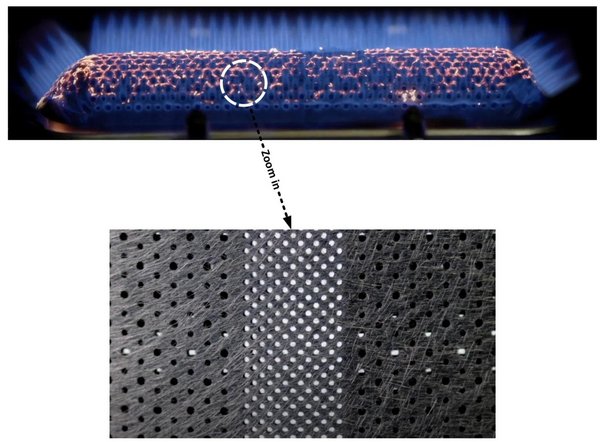Central-heating boilers development: combustion and thermoacoustics
Duration
October 2020 - September 2024Project Manager
This project focusses on the problem of noiseless combustion of central heating boilers equipped with promising and relatively new kind of perforated CERAMAT fibre burners (see Fig.1). We, researchers at Tu/e, in collaboration with Orkli company in Spain goal to achieve a full characterization of the thermo-acoustic properties of this type of burners and to develop numerical and experimental tools to enable an optimal design aiming clean, robust, and thermo-acoustically stable operation. The approach is to apply existing knowledge of laminar burners to perforated fibre mats and to study which geometry (i.e. porosity, fibre thickness, hole size and distribution) leads to best achievable performance in terms of broad range of operation conditions, emissions but also in terms of thermo-acoustic stability. A standard setup will be developed to study combustion behavior and emissions by operating with natural gas including hydrogen addition. Detailed numerical simulations of the flames, their emissions as well as their flame-acoustic interactions will be performed as well.
The project duration is four years. The most part of the work will be conducted at the research facilities of TU/e and partially at the research facilities of Orkli. The research will be fulfilled by one full-time working PhD employee (PDEng. Hamed Faghanpourganji) at TU/e. General and scientific supervision of the project at TU/e will be conducted by Dr. Kornilov, Prof. van Oijen, Prof. Lopez Arteaga and Prof. de Goey, plus technical support from Mr. Kepa Gaztanaga and Mr. Ignacio Sanchez from Orkli group.
In the first phase of the project, numerical and experimental analyses of the CERAMAT burner will be performed to develop network models for a predefined experimental mock-up of a boiler. The main goals in this phase is to apply state of the art knowledge to the CERAMAT burner and to exchange knowledge between TUe and Orkli.
In the second phase, we will apply the systems approach to the CERAMAT burner in order to study and characterize the intrinsic instability properties of this burner and develop dedicated tools for a universal (boiler independent) design of the burner, considering gas variation including hydrogen and propane, for example.
Our Partners
Researchers involved in this project
